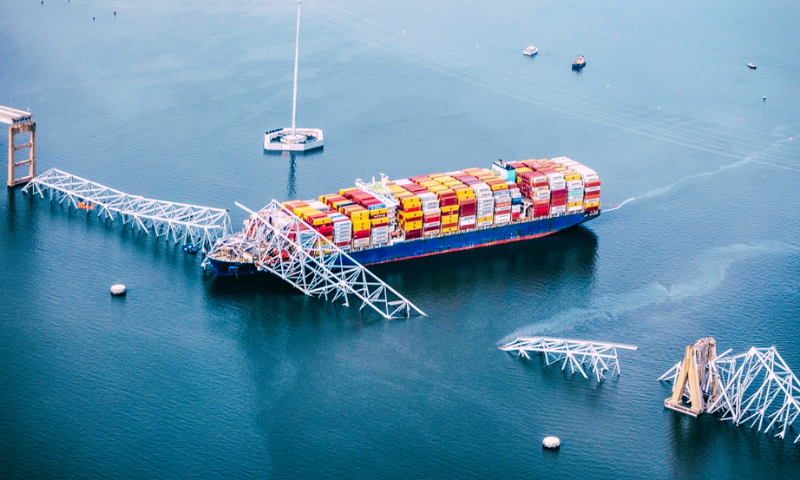Understanding the Legal Implications of MV Dali Ship Allision Case - Who pays for the loss?

On March 26, 2024, an Allision occurred between MV Dali and Francis Scott Key Bridge (Baltimore bridge), shortly after leaving Baltimore port in the US. The allision resulted in the death of 6 construction workers and damage to the ship, cargo, the bridge and port traffic, etc. Like every such incident, this incident also gave rise to the need to invoke the General Average and Salvage Clauses. Shortly after the incident, the owners of the ship declared General Average. The catastrophic effect of General Average is that the shippers and owners of the cargo would have to collectively and proportionately contribute for the loss incurred.
It is not the first time that such an incident has occurred. In the recent past there have been several instances of ship damage, cargo destruction and collision which have given rise to huge legal battles.
It is interesting to study the legal implications that arise which such case. Below are the points of contention in the Dali case.
Firstly, there is damage caused to the ship and the Baltimore bridge in addition to the loss of cargo. Since the Dali is stuck in the sea, several other containers containing refrigerated supplies will deteriorate before the ship can be refloated. The question arises, who will bear the loss for the damage caused? In the case of Dali, the shipowners have declared a General Average to recoup the costs associated with this loss. This article will explain how the age-old law of General Average is used to distribute huge losses amongst stakeholders.
Secondly, there is also the cost of removing debris from the ship and refloating the ship. Which stakeholders will bear the financial burden of recovering the ship. Can this cost of Salvage be recovered from all stakeholders of the ship?
Lastly, the damages and compensation for the loss are huge. Can the shipowner limit his liability to pay for such damages?
The owners of ship Dali have filed a petition in several courts to limit their liability to the cost of the ship.
Let us look at the first issue i.e General Average.
General average is a common process that follows after maritime casualties. The purpose of declaring General Average is to spread the cost of saving the ship and its cargo amongst all the stakeholders. General average adjusters are appointed to determine what proportion do the cargo owners owe. The principle of General Average is based on the concept of sharing losses. It is based on the concept that ‘that which has been sacrificed for the benefit of all shall be made good by the contributions of all’. This right arises whenever any extraordinary sacrifices have been made or extraordinary expenses incurred during a maritime adventure, all the parties to the maritime adventure must proportionately bear the loss or sacrifice made. It signifies that the carrier alone is not responsible for the loss but every cargo owner and stakeholder is responsible even for the loss of the other cargo owners as well as the ship itself.
Marine voyages often encounter perils, and in order to save the ship from a bigger loss, extraordinary expenses or sacrifices have to be incurred. The expense borne or the sacrifice made is then shared proportionately by all the parties interested in that maritime voyage.
The concept of General Average can be found in Common law, in the Marine Insurance Act 1963 and York Antwerp Rules 1890.
York Antwerp rules explains that ‘There is a General Average act when, and only when, any extraordinary sacrifice or expenditure is intentionally and reasonably made or incurred for the common safety for the purpose of preserving from peril the property involved in a common maritime adventure.’
Marine Insurance Act 1963 of India defines General Average in section 66(2).
‘There is a General Average act where any extraordinary sacrifice or expenditure is voluntarily and reasonably made or incurred in time of peril for the purpose of preserving the property imperilled in the common adventure.’
Not all expenses or sacrifices will amount to General Average. If the expenditure or sacrifice does not meet the conditions, it will amount only to a ‘particular average’ and not a general average and in such case the party that made such expense or sacrifice will not be entitled to receive contribution from other parties.
The conditions for a General Average are:-
- There must be an extraordinary sacrifice or expenditure
- It must be voluntary and reasonably made or incurred
- It must be made at the time of peril
- It must be incurred for a specific purpose of preserving the property imperilled.
BIMCO standard general average clause states that General Average claims must be settled as per the York-Antwerp Rules (YAR) 2016. The clause also requires that the loss for the cargo but be contributed to general average even if the average is the result of the master, pilot, or crew's fault, neglect, or error.
In the case of Dali, the owners of the ship have declared a General Average which means that the all the stakeholders such as charterer, shipper, cargo owner, ship owner will be liable to contribute for the loss irrespective of whose fault led to the loss.
Lets look at the second issue. Can the cost of Salvage be recovered from all stakeholders of the ship?
The incident has given rise to some additional costs such as the cost of refloating and towing the ship to the marine terminal, removing debris of the bridge and damaged containers, removing the section of the bridge that is still on the ship’s bow. All this entails huge costs.
The owners of Dali have invoked General Average to offset the cost of Salvage.
Salvage means the act of rescuing or saving endangered property or goods. Marine salvage is the process of recovering a ship after some kind of maritime accident. It is also the term used for the recovery of any cargo being transported by the vessel there are international laws concerning maritime salvage.
Salvage is governed by Salvage contract or Salvage clause in the charterparty agreement. The most famous are the SCOPIC clause or the Lloyd's Standard Form of Salvage Agreement or Lloyd's Open Form (LOF).
It may also be the case that no precontractual terms were agreed regarding Salvage. However, international conventions relating to Salvage such as the 1910 Brussels Convention for the Unification of Certain Rules with Respect to Assistance and Salvage at Sea, and the 1989 International Convention on Salvage will apply.
A question may arise if Salvage costs can be covered in General Average.
Rule VI of the York Antwerp rules 2016 provides that Salvage costs can be covered in General Average if the Salvage operations were carried out for the purpose of preserving the property from maritime peril.
It is not the first time that General Average claims for Salvage have arose. In March 2021, the owners of the ship Ever Given declared General Average. The ship was stuck for 6 days in the Suez Canal. The owner declared General Average and the effect was that shippers had to pay the required proportion of expenses in Salvage to rescue the ship.
The third major implication that arises is the question of limitation of liability of the shipowners.
The owners of Dali have filed a suit to limit their liability to $ 43.7 million. The estimated cost of the damage is more than $ 2 billion. And the shipowners seek to limit their liability to small percentage of this cost. Precisely only 1-2 % of the humongous value of the loss. The owners have relied on the Limitation of Liability Act 1851 of US which allows shipowners to limit their liability in accidents to the value of the ship. This law allows shipowners to restrict the total amount of their liability to no more than the post-accident value of the vessel, plus the value of pending freight.
An important convention worth mentioning here is the Convention on Limitation of Liability for Maritime Claims (LLMC). This convention covers two types of claims. First, claims relating to loss of life or personal injury and second, claims relating to loss to property such as ships, harbours, bridges etc. This convention allows shipowners to limit their liability as per below
However the LLMC Convention does not apply if the damage or loss was ‘the shipowner’s personal act or omission, committed with the intent to cause such a loss, or recklessly and with knowledge that such loss would probably result’.
The MV Dali case has disrupted the shipping sector considering that the allision occurred at one of the busiest ports. From a legal point of view, this case proves to be historic for applying century old laws of General Average, Salvage and limitation of liability.
____________________________________
If you want to know more about topics like "International Conventions & Regulations," “Ship Registration & Flag States,” "International Conventions," and "Maritime Liabilities" which will also be useful for your COC exam preparations, check out our FREE VIDEO COURE now. Click here.
Image Credits:
gCaptain
NBC News

Ms. Aufa Karnalkar
Ms. Aufa Karnalkar is a distinguished corporate lawyer and legal educator with a strong academic and professional background in maritime and corporate law. She holds an LLB from Pune and an LLM from Nottingham Trent University (UK), where her dissertation on the need for India to amend its shipping laws—considering recent changes in the UK—earned exceptional distinction.
An Advocate enrolled with the Bar Council of India and an SQE Solicitor candidate, she has several publications in leading legal journals and international conferences.
Alongside her corporate law practice, Ms. Aufa is actively involved in maritime and legal education, sharing her expertise across various platforms to shape the next generation of legal professionals.
Leave a comment
View more
Give your career a boost with S&B professional services.
CV Prep/EvaluationMore Jobs
Ship management
Mumbai
Electrical Superintendent
Ports and Pilotage
Mombasa, Kenya
AGM / DGM
Agency and Logistics
Dubai
Director Operations
Interview Prep/Mentoring
Find your polestar with the host of experts available on our platform
Know more

